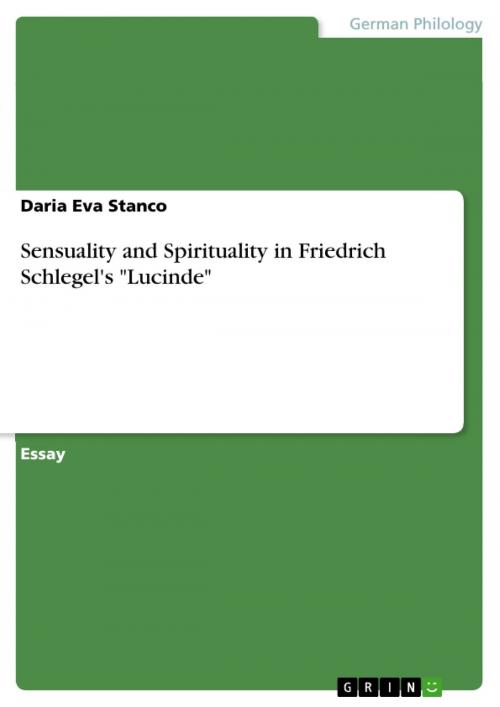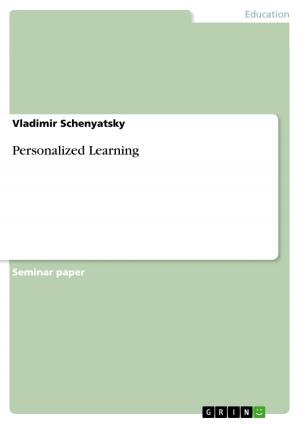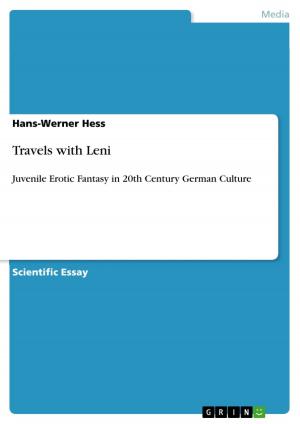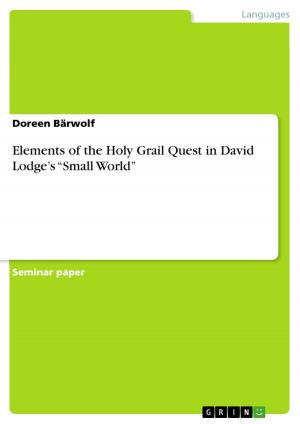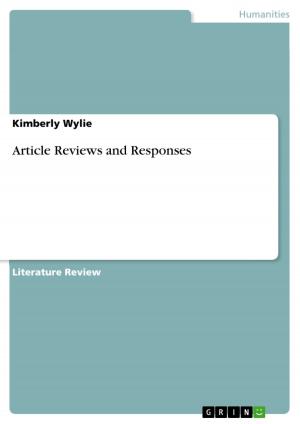Sensuality and Spirituality in Friedrich Schlegel's 'Lucinde'
Fiction & Literature, Literary Theory & Criticism, European, German| Author: | Daria Eva Stanco | ISBN: | 9783640196371 |
| Publisher: | GRIN Publishing | Publication: | October 27, 2008 |
| Imprint: | GRIN Publishing | Language: | English |
| Author: | Daria Eva Stanco |
| ISBN: | 9783640196371 |
| Publisher: | GRIN Publishing |
| Publication: | October 27, 2008 |
| Imprint: | GRIN Publishing |
| Language: | English |
Essay from the year 2007 in the subject German Studies - Modern German Literature, grade: 1,0, University of London (Queen Mary College), 10 entries in the bibliography, language: English, abstract: Regarding the sheer functions of the senses, one usually refers to anatomy or medicine. Thinking of the effects of sensual perception on the human psyche, however, one inevitably has to turn to psychology. Even in our postmodern multimedial world, there still exists a certain segregation between outer sensual perception and inner feelings or imaginations. There are rare attempts to bring together both mind and body, medicine and psychology and, for instance, to heal diseases in a holistic way. And yet, in the 18th century, the detachment of sensual perception and spirituality was much more absolute than it is today. Not only was love as a unity of sensuality and spiritual understanding unthinkable, but also sensuality in connection with love was abominated by public opinion (Behler 1962: XXIV). In the then upcoming Romantic movement, the idea of the unity of mind and body was prevalent (Behler 1962: XXXII). Although the Romanticists emphasized the immaterialistic and irrational such as emotion and imagination, they strived to bring together all extremes (see also ch. II). In the novel 'Lucinde' by Friedrich Schlegel, the inner state of mind and the outer sensual perceptions determine one another. Taking into consideration this interplay as well as the Romantic vision of unity, one cannot possibly investigate the five senses without referring to the inner state - or the inner sense/senses. Therefore, in this essay, the mingling of sensuality and spirituality in Schlegel's 'Lucinde' will be analysed. Beforehand, a brief outline of the Romantic ideology of the senses and how it was influenced by earlier philosophers will be given in order to gain a deeper understanding of the topic.
Essay from the year 2007 in the subject German Studies - Modern German Literature, grade: 1,0, University of London (Queen Mary College), 10 entries in the bibliography, language: English, abstract: Regarding the sheer functions of the senses, one usually refers to anatomy or medicine. Thinking of the effects of sensual perception on the human psyche, however, one inevitably has to turn to psychology. Even in our postmodern multimedial world, there still exists a certain segregation between outer sensual perception and inner feelings or imaginations. There are rare attempts to bring together both mind and body, medicine and psychology and, for instance, to heal diseases in a holistic way. And yet, in the 18th century, the detachment of sensual perception and spirituality was much more absolute than it is today. Not only was love as a unity of sensuality and spiritual understanding unthinkable, but also sensuality in connection with love was abominated by public opinion (Behler 1962: XXIV). In the then upcoming Romantic movement, the idea of the unity of mind and body was prevalent (Behler 1962: XXXII). Although the Romanticists emphasized the immaterialistic and irrational such as emotion and imagination, they strived to bring together all extremes (see also ch. II). In the novel 'Lucinde' by Friedrich Schlegel, the inner state of mind and the outer sensual perceptions determine one another. Taking into consideration this interplay as well as the Romantic vision of unity, one cannot possibly investigate the five senses without referring to the inner state - or the inner sense/senses. Therefore, in this essay, the mingling of sensuality and spirituality in Schlegel's 'Lucinde' will be analysed. Beforehand, a brief outline of the Romantic ideology of the senses and how it was influenced by earlier philosophers will be given in order to gain a deeper understanding of the topic.
